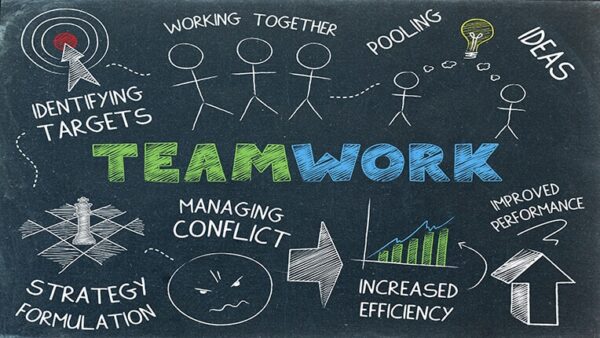**Mastering the Art of Teamwork: Essential Skills for Effective Collaboration**
In today’s dynamic and interconnected professional landscape, the ability to work effectively within a team is a crucial skill. Whether in the workplace, academic settings, or community projects, successful collaboration requires a combination of interpersonal, communication, and problem-solving skills. Let’s delve into the key skills that contribute to mastering the art of teamwork:
1. Communication Skills:
Clear and concise communication lies at the heart of effective teamwork. Team members must be able to articulate their ideas, actively listen to others, and provide constructive feedback. Clear communication ensures that everyone is on the same page, minimizing misunderstandings and enhancing collaboration.
2. Active Listening:
Actively listening to team members fosters understanding and encourages a collaborative environment. It involves paying full attention, asking clarifying questions, and demonstrating empathy. This skill helps in building trust and ensures that each team member’s perspective is valued.
3. Conflict Resolution:
Conflicts are inevitable in any team, but the ability to navigate and resolve them constructively is vital. Team members should be adept at identifying the root causes of conflicts, facilitating open discussions, and finding mutually agreeable solutions. Effective conflict resolution strengthens team cohesion.

4. Flexibility and Adaptability:
Successful teamwork often requires adaptability to changing circumstances. Being flexible allows team members to adjust to new information, unexpected challenges, and different working styles. It promotes a dynamic and resilient team that can navigate various situations with ease.
5. Problem-Solving Skills:
Teams frequently encounter challenges and obstacles. Strong problem-solving skills involve analyzing situations, brainstorming creative solutions, and implementing effective strategies. A team that collectively addresses challenges is more likely to achieve its goals.
6. Time Management:
Efficient use of time is crucial in any collaborative effort. Team members should be able to prioritize tasks, set deadlines, and manage their time effectively to ensure that the team stays on track and meets its objectives.
7. Leadership and Followership:
Teamwork often involves a balance of leadership and followership. While leadership skills enable individuals to guide and motivate the team, followership is equally important, involving the ability to support and execute tasks as part of the team.
8. Trust Building:
Trust is the foundation of successful teamwork. Team members must trust each other’s abilities, reliability, and intentions. Trust-building activities, transparent communication, and consistent actions contribute to the development of a cohesive and high-functioning team.
9. Emotional Intelligence:
Emotional intelligence involves understanding and managing one’s own emotions and empathizing with the emotions of others. Team members with high emotional intelligence are better equipped to navigate interpersonal dynamics, build strong relationships, and handle stress effectively.
10. Role Clarity:
Clearly defined roles and responsibilities ensure that each team member understands their contribution to the overall goal. Role clarity minimizes confusion, avoids duplication of efforts, and enhances accountability within the team.
Mastering the art of teamwork is an ongoing process that requires individuals to continuously develop and refine these essential skills. As workplaces and projects become increasingly collaborative, those who excel in teamwork are better positioned to contribute positively to their teams, organizations, and broader communities.
**The Benefits of Teamwork: Unlocking Collective Success**
Teamwork is a cornerstone of success in various aspects of life, be it in the workplace, academia, or community endeavors. The power of collaborative effort extends far beyond individual accomplishments, offering a multitude of benefits that contribute to overall success and fulfillment.
1. Diverse Perspectives:
Teamwork brings together individuals with diverse backgrounds, skills, and perspectives. This diversity fosters creativity and innovation, as team members can draw upon a range of experiences and ideas to solve problems and generate unique solutions.
2. Enhanced Problem-Solving:
Combining the strengths and expertise of team members often leads to more effective problem-solving. Each individual may approach challenges differently, contributing valuable insights and strategies that, when combined, create comprehensive solutions.
3. Increased Efficiency:
Teamwork allows for the division of labor, enabling tasks to be completed more efficiently. By assigning roles based on individual strengths, teams can accomplish goals more quickly than individuals working in isolation.
4. Skill Development:
Working in a team provides opportunities for skill development. Team members can learn from each other, share knowledge, and acquire new competencies. This continuous learning process contributes to both personal and professional growth.
5. Improved Communication:
Team environments promote effective communication. Regular discussions, brainstorming sessions, and updates ensure that everyone is on the same page. This clarity minimizes misunderstandings and enhances overall productivity.
6. Increased Motivation:
The sense of shared responsibility and camaraderie in a team often boosts motivation. Knowing that one’s efforts contribute to a collective goal fosters a strong sense of purpose and commitment among team members.
7. Building Trust:
Teamwork is a foundation for trust-building. Through collaboration and shared experiences, team members develop trust in each other’s abilities and intentions. This trust is essential for effective communication and collaboration.
8. Flexibility and Adaptability:
Teams are better equipped to adapt to changing circumstances. The collective skill set and diverse perspectives within a team allow for greater flexibility in responding to challenges and seizing opportunities.
9. Stress Reduction:
Shared responsibilities mean that no single individual bears the full burden of a project or task. This distribution of workload contributes to stress reduction, promoting a healthier and more sustainable work environment.
10. Celebrating Success Together:
Perhaps one of the most rewarding aspects of teamwork is the ability to celebrate successes together. Achieving a shared goal fosters a sense of accomplishment and creates a positive and supportive team culture.
In essence, the benefits of teamwork extend beyond the immediate task at hand. They influence personal growth, organizational success, and the overall satisfaction of individuals involved. By harnessing the collective strength of diverse talents and perspectives, teamwork becomes a driving force for achieving excellence and creating a positive impact.




